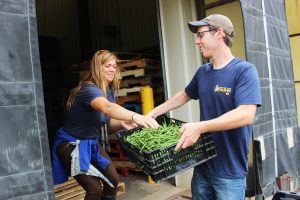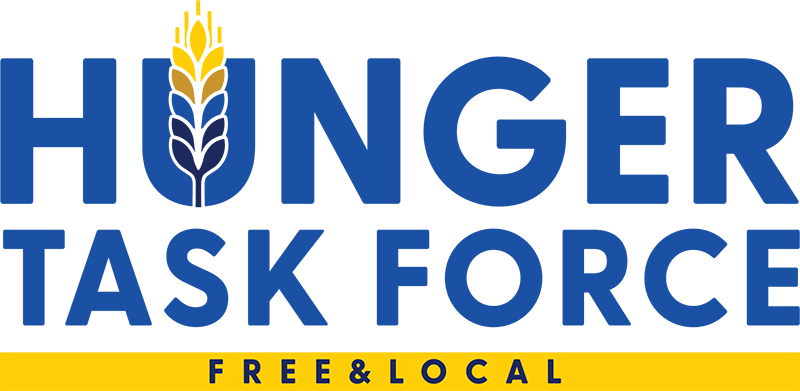Sarah Wisniewski & Kyle Koch of The Hunger Task Force Farm Feed A Community
“What sets this farm apart from others is the idea that the sole purpose of this farm is to help, feed, and provide healthy, nutritious, and fresh produce to local families who don’t have access to that kind of food,” says Sarah Wisniewski, Farm Produce Manager for the Milwaukee Hunger Task Force.
“We don’t charge for the food—it’s literally free of charge—and with the help of the volunteers, the time from the food in the ground to a farm, pantry or kitchen table is typically 24 to 48 hours.” This sentiment about freshness is echoed by Kyle Koch, the Farm Operations Manager. “We often ask our volunteers to put themselves in the shoes of someone who needs food. You can imagine that somebody going to the grocery store and seeing highly processed items being cheap relative to the cost of vegetables might be inclined to buy the less healthy, highly-processed—but more affordable—foods. And they’re often disinclined to buy the food that is fresh and nutritious. The reason we do what we do is to provide fruits and vegetables that are nutritious to people that would not otherwise have access to these items.”
Located in Franklin, Wisconsin, the Hunger Task Force Farm comprises 208 acres and supplies about 50,000 people with food each month. Each season, about half a million pounds of food are supplied from The Farm to food pantries, soup kitchens, homeless shelters and other sites. There are nine full-time staff at the farm and more than 5,000 volunteers a year. Together, they grow approximately 25 different fruits and vegetables.
The volunteers act as the “backbone of the labor force of the farm.” Kyle notes, “It’s a bit nontraditional, but it’s a way for us to interact with the community really well.” There are two volunteer shifts, one in the morning and one in the afternoon, each lasting for three hours. Sarah emphasizes that the training is really hands-on. “Even if the volunteers have been here before, there are different tasks that they’ve never done before.” Kyle adds, “A typical volunteer shift involves a special meeting for the volunteers where we do a general introduction and we talk about the Hunger Task Force and what the Farm is all about. Then, we’ll take them out into a field, and we’ll show what the activity is.” People of all ways of life come to work on the farm, including retirees, corporate groups and high school students.
For Kyle, who started farming the week after graduating with a degree in agronomy from University of Wisconsin-Madison, working with Hunger Task Force fulfills his desire to work with his hands and be outside. “I think the act of feeding people is really important,” says Kyle. “And agriculture is a way to address the environmental issues that we’re facing right now, like climate change and habitat loss. And it’s a way to effect positive change through directly helping farmers.”

Sarah and Kyle share the load of fresh-picked green beans.
“I also truly enjoy running food from seed to harvest and nourishing people.” – Sarah Wisniewski
Similarly, Sarah joined a farm right after graduating with a degree in environmental science and conservation. Like Kyle, her reasons for working with the Hunger Task Force are both nature- and nuture-related. “What interests me about farming is being outside in the fresh air and sunshine and interacting with nature. Also, just the variety that farming brings—all the different types of operations and tasks that need to get done to proceed throughout the day. I also truly enjoy running food from seed to harvest and nourishing people.”
Sustainability is an important aspect of operations at the Hunger Task Force Farm. Several different sustainability initiatives, such as a land conservation and a sub-surface irrigation system, are currently in the works. Further, The Farm has embraced minimalist interventions for any pest issues. “One of the challenges with what we do is that there is so much that’s out of our control,” Kyle notes. “There will be weather and pest issues.”
This year has been particularly difficult. New pest species—especially insects—are becoming more common, including some Kyle hasn’t seen in his years on The Farm. Extreme weather patterns have also become more prevalent. Wisconsin received uncommonly heavy rain earlier this year and droughts have become more common, with two (in 2012 and 2016) occurring in the last nine years. “You can’t attribute that definitely to climate change, but I think a lot of people would,” he says.
Hunger Task Force is also involved in land stewardship. The Farm has about a hundred acres of natural area, including an oaks savannah (characterized by prairie plants, oak trees, and a fair amount of light penetration), which creates a specific ecosystem for certain wildlife. The oaks savannah, which used to be a common ecosystem type in Wisconsin, is now heavily endangered. The Farm has been restoring the land for the past seven years, replacing invasive plants with native species on a regular basis to maintain the authenticity of the oaks savannah landscape.
“The sole reason we exist is to provide healthy, in-season, nutritious fruits and vegetables to families that would not otherwise be able to afford them,” Kyle says. “We’re trying to do so in a sustainable environment and the degree of community engagement that we have is key to accomplishing that.” Sarah adds, “The Farm relies on a lot of local and regional publicity and donors to support the work that we’re doing every single season.” The community, they both agree, is necessary for the Hunger Task Force Farm to continue to feed people in a dignified way through high quality and healthy food.
—————————————————
